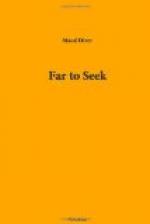On an unclouded afternoon of October, Roy sat alone with Thea Leigh in a shady corner of the Residency garden, smoking and talking, feeling blissfully at ease in body, and very much at home in spirit. After the wrench of parting with Desmond, it was balm to be welcomed by the sister who shared his high courage and enthusiasm for life, and who was smiling at Roy now with the same hazel-grey eyes that both had gotten from their father. But Thea’s hair—her crown of glory—belonged exclusively to herself. The colour of it reminded him, with a pang, of autumn beech leaves, in his own woods. It enhanced the vivid quality of her beauty, and added appreciably to his pleasure in watching her while she talked.
Roy had arrived that morning, in the mist-laden chill of dawn; had enjoyed a long talk with Colonel Leigh; had made the acquaintance of Vernon and Phyllis, aged six and four; also of Flossie Eden, a kind of adopted daughter, aged twenty; and, tiffin being over, had announced his intention of riding out to re-discover the rose-red wonderland of his childish dreams—the peacocks and elephants and crocodiles and temple bells. Thea, however, had counselled patience, threatening him with dire disillusion, if he went seeking his wonderland at that glaringly unpoetic time of day.
“An early cup of tea, and a ride afterwards,” she prescribed, in her best autocratic manner. “Only sunset, or the first glimmer of dawn, can throw a spell over the municipal virtues and artistic backslidings of Jaipur! I speak with feeling; because I rushed forth untimely; and, in the full glare of afternoon sunshine, your rose-red city looked like nothing on earth but a fearful and wonderful collection of pink and white birthday cakes, set out for a giants’ tea-party! It seemed almost a pity the giants had never come and eaten them up. Vinx said I was ribald. As a matter of fact, he was simply jealous of my brilliant metaphor! Look at him now—bored to death with me, because I’m telling the truth!”
Colonel Leigh—a tall pensive-looking man, who talked little and listened assiduously—met her challenge with the indulgent smile of a husband who can be at once amused and critical and devoted: an excellent conjunction in marriage.
“If you can stay Roy’s impatience with your metaphors, I’ll begin to have some respect for them!” said he.
And she was staying Roy’s impatience now, with cigarettes and coffee and the tale of Aruna—’England-returned.’ She had revealed little by letter; an uncharacteristic touch of caution derived from her husband, who questioned the wisdom of her bold incursion into the complexities and jarring elements of a semi-modern Hindu household. But Thea Leigh, daughter of Honor Desmond, was strongly imbued with the responsibility of the ruling race. She stoutly refused to preserve, in Jaipur, the correct official detachment of Anglo-India. More: she possessed a racial wisdom of the heart, not to be gainsaid; as who should know better than her husband, since it had saved him from himself. And now, having secured Roy for half an hour, she confided to him, unreservedly, all she could gather of the tragic tangle she was unravelling in her own effective fashion.




